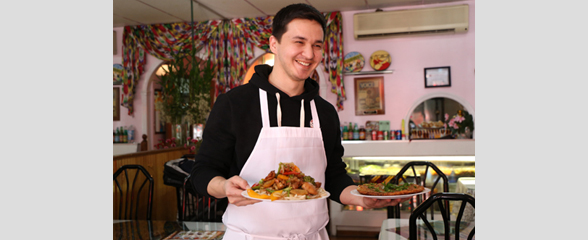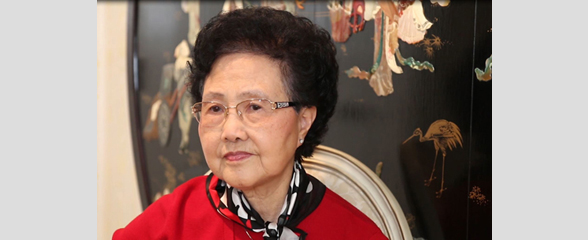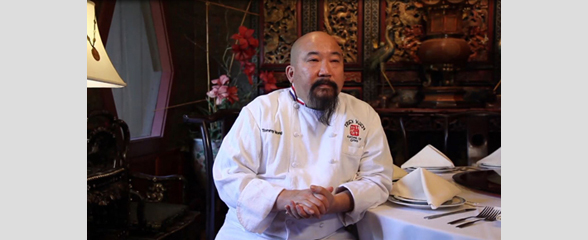Cooking

2016.037.010 Oral History Interview with Jeff Gao, 2015/11/14
Jeff Gao was born in 1976 in Shandong, China. He grew up during the end of the Cultural Revolution, thus he did not have an abundant amount of food to eat or experience. From a young age, he talks of his fondness of hand-pulled noodles and his determination to learn how to make the noodles from a chef he knew. Later, he went on to study in Beijing and eventually travel the world to learn about food internationally. His first restaurant Little Yunnan in Beijing was a huge success and the restaurant brought him success and fame in the food industry and was named one of the best restaurants in China. After the success of his initial restaurant, Gao eventually opened another restaurant in Boulder, Colorado in the United States. In his interview, Gao recounts his experience with food as he emphasizes the importance of high quality ingredients, cooking techniques, and cooking with serious passion.

2016.037.017 Oral History Interview with Doniyar Sobitov, 2016/03/29
Doniyar Sobitov was raised in Tashkent, Uzbekistan and moved to New York City in 2007 with his father and brother. His family opened their Halal Uzbek restaurant called Café Kashkar together in Brooklyn. Café Kashkars food is based on cuisine from the Kashgar region, a city in the western side of Chinas Xinjiang province. During this oral history interview, Sobitov describes his childhood in Tashkent, learning to cook with his father, and his aspiration to attend culinary school in China eventually. He goes on to explain that food is not only an important aspect of Uzbekistan culture, but also a means for life and survival for his family. Sobitov lives in the United States with his father, brother, and sister, but his mother, wife, and two year old child still live in Tashkent, a division that is difficult for his family. Describing the multilingual neighborhood in which Café Kashkar is located, Sobitov explains that he speaks four languages in addition to english to communicate with his diverse customer base: Turkish, Uzbek, Russian, and Uyghur. He emphasizes the similarities between Uyghur and Chinese food, describing them as “basically the same thing†and adds that Cafe Kashkar imports some of its key ingredients from Xinjiang.

2016.037.021 Oral History Interview with Kimmie Lee Tie
Kimmie Lee Tie discusses her early life in China and how World War II impacted her family and interestingly her diet. She talks about the experiences she had cooking on her familys small farm and how after the war she married a Chinese American sailor and moved to the United States. Living in the US, Kimmie and her husband bought a Cantonese restaurant in 1957 which they operated for twenty years. In this environment, she taught herself how to cook with a wok and developed her Chinese American tastes. Make sure to listen in for her personal recipes, especially her favorite butterfly shrimp.

2016.037.026 Oral History Interview with Tommy and Frank Wong
Tommy and Frank Wong discuss their experience coming to America from Hong Kong with their three brothers and working in a variety of restaurants before starting their own. The brothers lived across the US in Texas, Kansas, and San Francisco until they started their own restaurant in New Orleans. Tommy offers an interesting explanation of the history of Chinese food in America as well as how he worked to blend the styles and flavors of Chinese and Louisiana cuisine into what he considers to be the highlights of both. Frank similarly offers some recipes and explains the influence of local Louisiana cuisine on his cooking. He concludes by discussing some of his familys charity work and urging Chinese restaurants to be supportive of one another and not be too competitive.

2016.037.032 Oral History Interview with Grace Young Interview 2016/03/11
This oral history focuses on Grace Young, a food writer who has authored three books on her family’s Cantonese stir fry cuisine. Grace grew up in San Francisco as a first-generation Chinese American and pursued a career in Western styles of food before exploring her familys traditional style of Chinese cooking. Through this journey, she learned about the Chinese American experience through the lens of food and how food acts as a link in the Chinese diaspora. Graces first book, Wisdom of the Kitchen, recounts her familys recipes and stories, which were collected by observing her parents techniques. The Breath of the Wok focuses on the important tradition of the iron wok in the home kitchen, a practice that is disappearing in Chinese homes. Stir-Frying to the Skys Edge offers Graces advice on stir fry and contains interviews from Chinese cooks around the world.